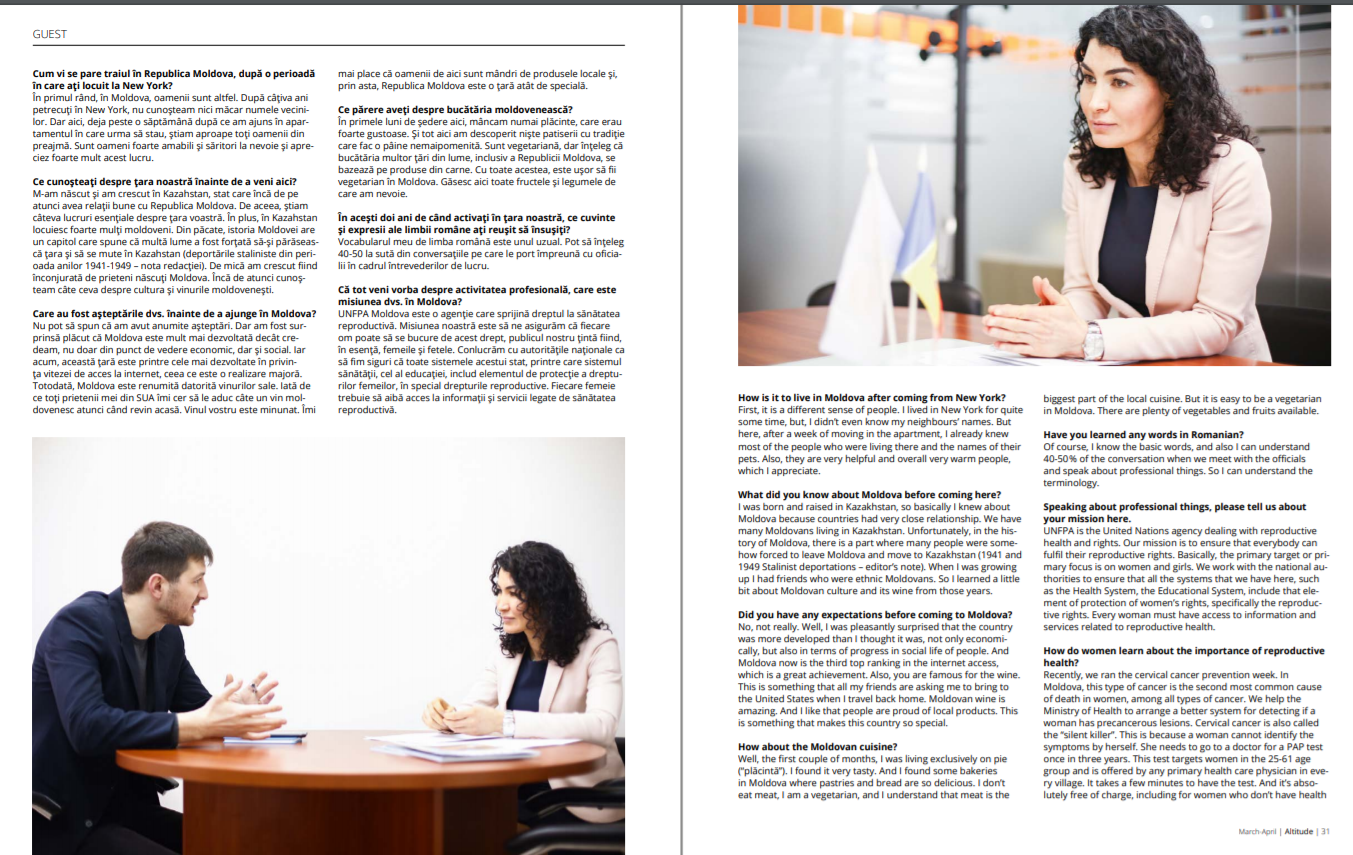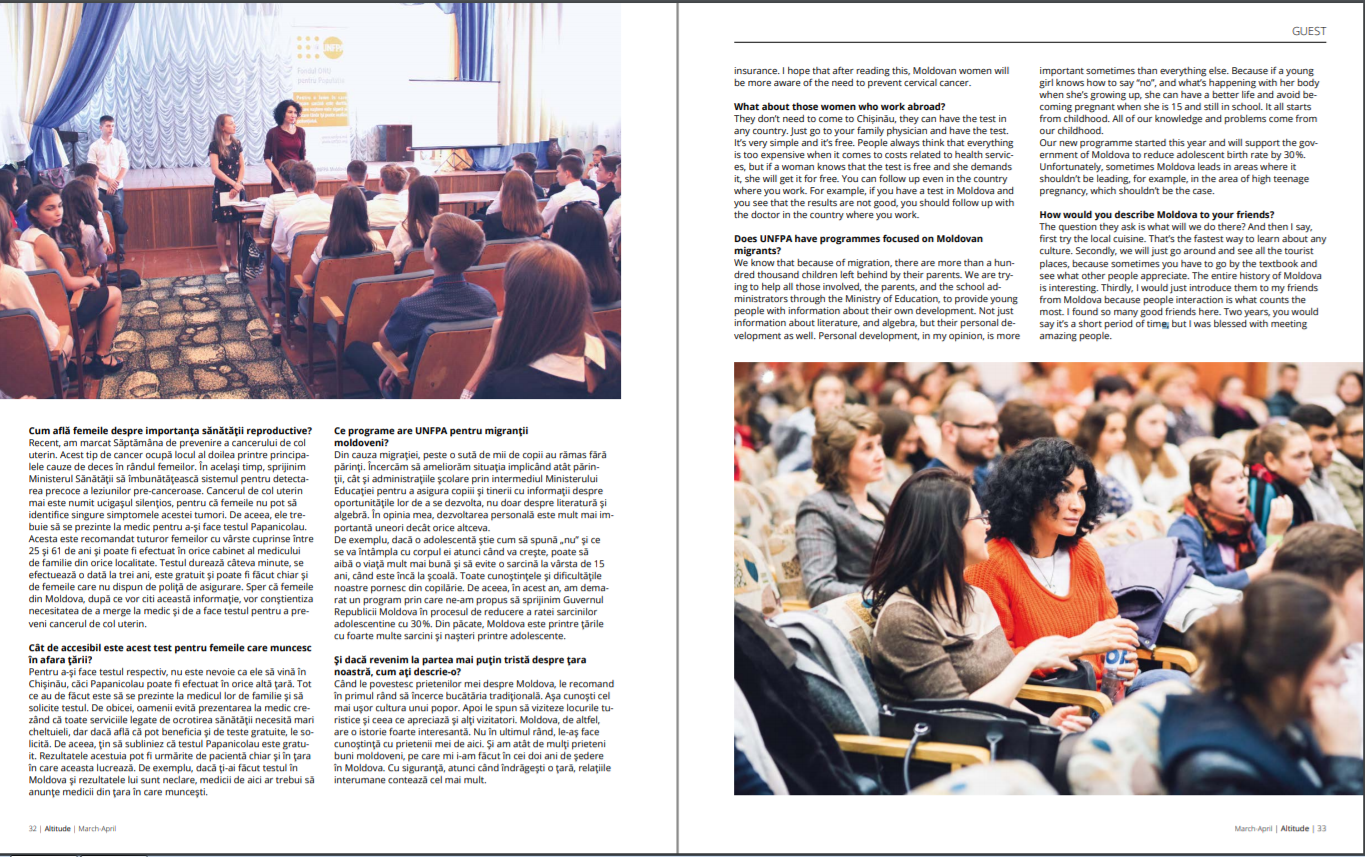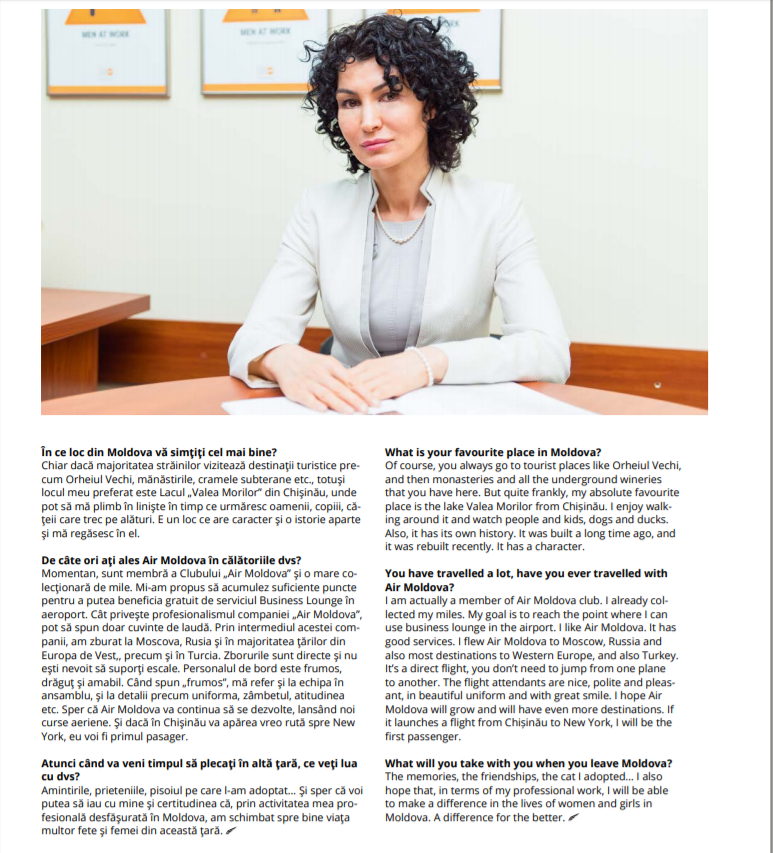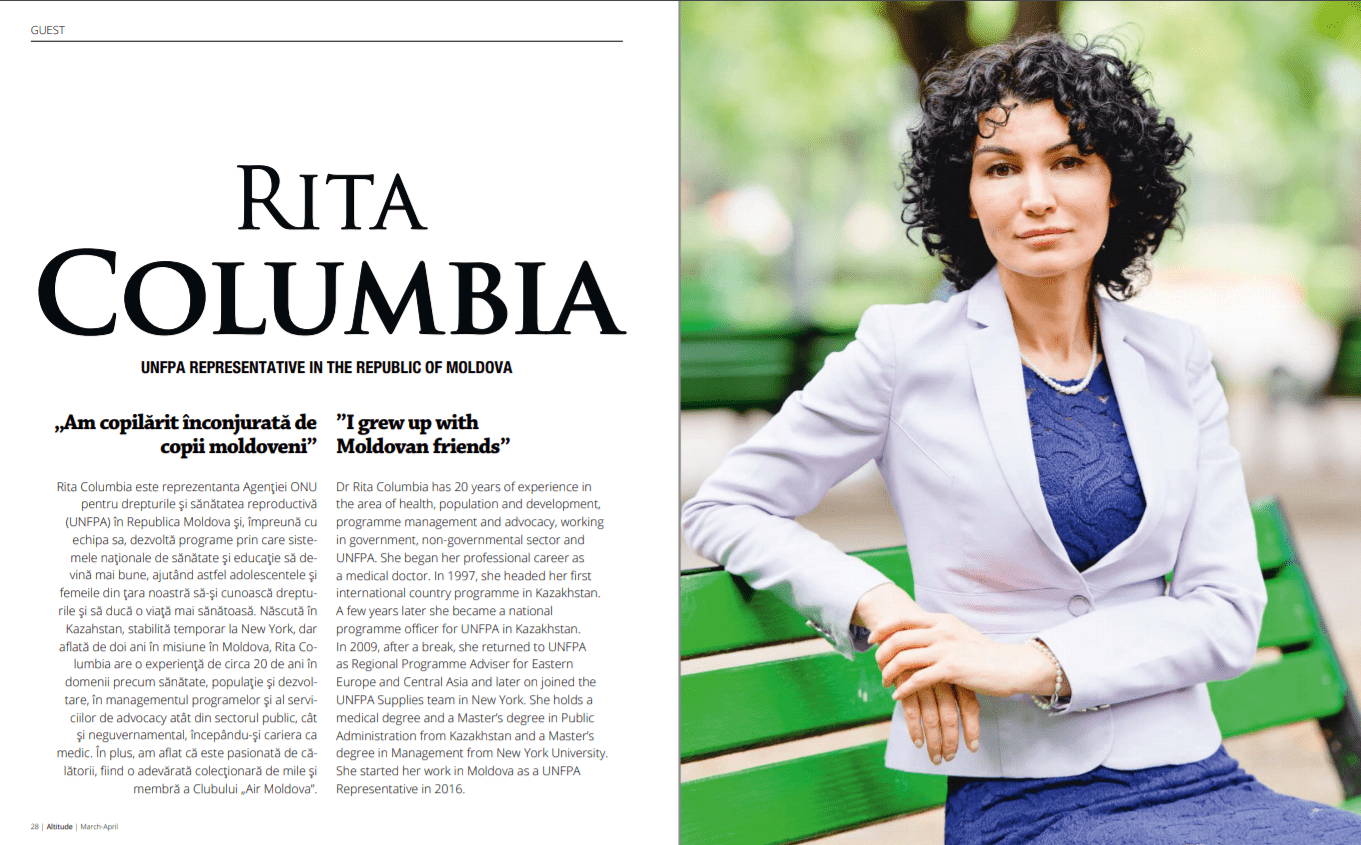Dr. Rita Columbia has 20 years of experience in the area of health, population and development, programme management and advocacy, working in government, non-governmental sector and UNFPA -the United Nations reproductive health and rights agency. She began her professional career as a medical doctor. In 1997, she headed her first international country programme in Kazakhstan. A few years later she became a national programme officer for UNFPA in Kazakhstan. In 2009, after a break, she returned to UNFPA as Regional Programme Adviser for Eastern Europe and Central Asia and later on joined the UNFPA Supplies team in New York. She holds a medical degree and a Master’s degree in Public Administration from Kazakhstan and a Master’s degree in Management from New York University. She started her work in Moldova as a UNFPA Representative in 2016.
How is it to live in Moldova after coming from New York?
First, it is a different sense of people. I lived in New York for quite some time, but, I didn’t even know my neighbours' names. But here, after a week of moving in the apartment, I already knew most of the people who were living there and the names of their pets. Also, they are very helpful and overall very warm people, which I appreciate.
What did you know about Moldova before coming here?
I was born and raised in Kazakhstan, so basically I knew about Moldova because countries had very close relationship. We have many Moldovans living in Kazakhstan. Unfortunately, in the history of Moldova, there is a part where many people were somehow forced to leave Moldova and move to Kazakhstan (1941 and 1949 Stalinist deportations - editor's note). When I was growing up I had friends who were ethnic Moldovans. So I learned a little bit about Moldovan culture and its wine from those years.

Did you have any expectations before coming to Moldova?
No, not really. Well, I was pleasantly surprised that the country was more developed than I thought it was, not only economically, but also in terms of progress in social life of people. And Moldova now is the third top ranking in the internet access, which is a great achievement. Also, you are famous for the wine. This is something that all my friends are asking me to bring to the United States when I travel back home. Moldovan wine is amazing. And I like that people are proud of local products . This is something that makes this country so special.
How about the Moldovan cuisine?
Well, the first couple of months, I was living exclusively on pie ("plăcintă"). I found it very tasty. And I found some bakeries in Moldova where pastries and bread are so delicious. I don't eat meat, I am a vegetarian, and I understand that meat is the biggest part of the local cuisine. But it is easy to be a vegetarian in Moldova. There are plenty of vegetables and fruits available.
Have you learned any words in Romanian?
Of course, I know the basic words, and also I can understand 40-50% of the conversation when we meet with the officials and speak about professional things. So I can understand the terminology.
Speaking about professional things, please tell us about your mission here.
UNFPA is the United Nations agency dealing with reproductive health and rights. Our mission is to ensure that everybody can fulfil their reproductive rights. Basically, the primary target or primary focus is on women and girls. We work with the national authorities to ensure that all the systems that we have here, such as the Health System, the Educational System, include that element of protection of women's rights, specifically the reproductive rights. Every woman must have access to information and services related to reproductive health.

How do women learn about the importance of reproductive health?
Recently, we ran the cervical cancer prevention week. In Moldova, this type of cancer is the second most common cause of death in women, among all types of cancer. We help the Ministry of Health to arrange a better system for detecting if a woman has precancerous lesions. Cervical cancer is also called the “silent killer”. This is because a woman cannot identify the symptoms by herself. She needs to go to a doctor for a PAP test once in three years. This test targets women in the 25-61 age group and is offered by any primary health care physician in every village. It takes a few minutes to have the test. And it's absolutely free of charge, including for women who don’t have health insurance. I hope that after reading this, Moldovan women will be more aware of the need to prevent cervical cancer.
What about those women who work abroad?
They don't need to come to Chișinău, they can have the test in any country. Just go to your family physician and have the test. It's very simple and it's free. People always think that everything is too expensive when it comes to costs related to health services, but if a woman knows that the test is free and she demands it, she will get it for free. You can follow up even in the country where you work. For example, if you have a test in Moldova and you see that the results are not good, you should follow up with the doctor in the country where you work.
Does UNFPA have programmes focused on Moldovan migrants?
We know that because of migration, there are more than a hundred thousand children left behind by their parents. We are trying to help all those involved, the parents, and the school administrators through the Ministry of Education, to provide young people with information about their own development. Not just information about literature, and algebra, but their personal development as well. Personal development, in my opinion, is more important sometimes than everything else. Because if a young girl knows how to say "no", and what's happening with her body when she's growing up, she can have a better life and avoid becoming pregnant when she is 15 and still in school. It all starts from childhood. All of our knowledge and problems come from our childhood.
Our new programme started this year and will support the government of Moldova to reduce adolescent birth rate by 30%. Unfortunately, sometimes Moldova leads in areas where it shouldn't be leading, for example, in the area of high teenage pregnancy, which shouldn't be the case.
How would you describe Moldova to your friends?
The question they ask is what will we do there? And then I say, first try the local cuisine. That's the fastest way to learn about any culture. Secondly, we will just go around and see all the tourist places, because sometimes you have to go by the textbook and see what other people appreciate. The entire history of Moldova is interesting. Thirdly, I would just introduce them to my friends from Moldova because people interaction is what counts the most. I found so many good friends here. Two years, you would say it's a short period of time, but I was blessed with meeting amazing people.
Dr Rita Columbia has 20 years of experience in the area of health, population and development, programme management and advocacy, working in government, non-governmental sector and UNFPA -the United Nations reproductive health and rights agency. She began her professional career as a medical doctor. In 1997, she headed her first international country programme in Kazakhstan. A few years later she became a national programme officer for UNFPA in Kazakhstan. In 2009, after a break, she returned to UNFPA as Regional Programme Adviser for Eastern Europe and Central Asia and later on joined the UNFPA Supplies team in New York. She holds a medical degree and a Master’s degree in Public Administration from Kazakhstan and a Master’s degree in Management from New York University. She started her work in Moldova as a UNFPA Representative in 2016.

What is your favourite place in Moldova?
Of course, you always go to tourist places like Orheiul Vechi, and then monasteries and all the underground wineries that you have here. But quite frankly, my absolute favourite place is the lake Valea Morilor from Chișinău. I enjoy walking around it and watch people and kids, dogs and ducks. Also, it has its own history. It was built a long time ago, and it was rebuilt recently. It has a character.
You have travelled a lot, have you ever travelled with Air Moldova?
I am actually a member of Air Moldova club. I already collected my miles. My goal is to reach the point where I can use business launge in the airport. I like Air Moldova. It has good services. I flew Air Moldova to Moscow, Russia and also most destinations to Western Europe, and also Turkey. It's a direct flight, you don't need to jump from one plane to another. The flight attendants are nice, polite and pleasant, in beautiful uniform and with great smile. I hope Air Moldova will grow and will have even more destinations. If it launches a flight from Chișinău to New York, I will be the first passenger.
What will you take with you when you leave Moldova?
The memories, the friendships, the cat I adopted… I also hope that, in terms of my professional work, I will be able to make a difference in the lives of women and girls in Moldova. A difference for the better.
Interview to Air Moldova in-flight magazine "Altitude", March 2018 issue.


